Know Your Tick Facts
Chart showing types of ticks, their physical structure and the types of diseases they carry
|
American Dog Tick
|
Dermacentor
variabilis |
Soft Ticks
|
Ornithodoros
|
| The American Dog Tick can transmit Rocky Mountain Spotted fever, Tularemia, Ehrlichia, and Tick Paralysis. | 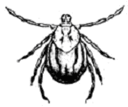 |
Soft ticks do not have the hard shell and are shaped like a large raisin. Soft ticks carry Tick Relapsing Fever. |  |
|
Ixodes Pacificus
|
Western Black
Legged Tick |
Ixodes Scapularis
|
Deer Tick
|
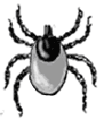 |
The Western Black Legged Tick is prevalent on west coast. It transmits Babesia, Lyme disease, Bartonella and Ehrlichia. | 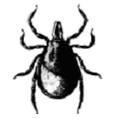 |
The Deer Tick is prevalent on East Coast and transmits Lyme disease, Ehrlichia, Babesia, and Bartonella |
|
Brown Dog Tick
|
Rhipicephalus Sanguineus
|
Rocky Mtn
Wood Tick |
Dermacentor Andersoni
|
| The Brown Dog tick carries Q Fever. | 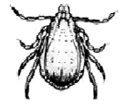 |
The Rocky Mountain Wood Tick transmits Tularemia, Tick paralysis, Rocky Mountain Spotted Fever, Q Fever,, and Colorado Tick Fever. | 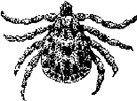 |
|
Identifying features on Pacific Coast Tick
Dermacentor Occidentalis |
Lone Star Tick
|
Amblyomma Americanum
|
|
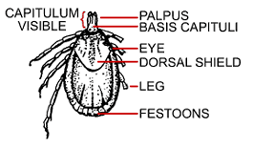 |
The Lone Star Tick is prevalent in the South West and can transmit Rocky Mountain Spotted Fever, Tularemia, and Ehrlichia, Q Fever and Tick Paralysis as well as Borrelia lonestari, which causes a Lyme disease like illness | 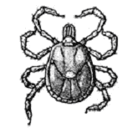 |
|
| The Pacific Coast Tick is prevalent in the West and South West. It can transmit Colorado Tick Fever virus, the Rickettsia of Q Fever and Spotted fever as well as the bacterium that causes Tularemia. Known to cause tick paralysis in cattle, horses and deer. Bite wounds are commonly mistaken for wounds caused by biting | The species of bacteria among the tick-borne pathogens are diverse. This complicates diagnosis because current antibody tests are species-specific.15 tick-borne bacterial pathogens have been identified worldwide, including 3 species of Ehrlichia, and 4 or 5 of B. burgdorferi. Scientists have not identified all of the pathogens that ticks may carry. | ||








We invite you to comment on our Facebook page.
Visit LymeDisease.org Facebook Page